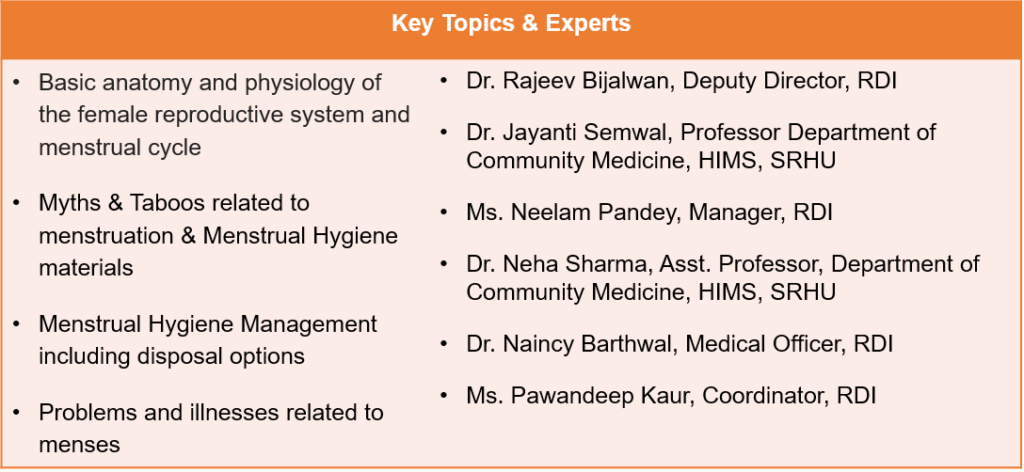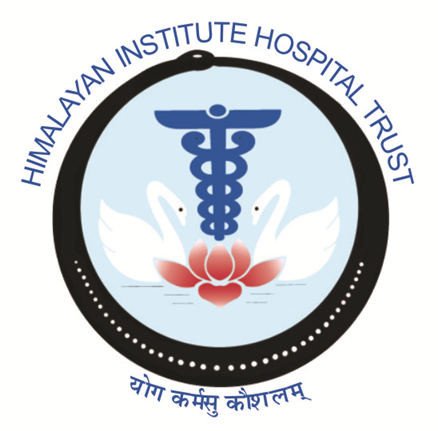For decades, the Rural Development Institute at the Himalayan Institute Hospital Trust has been at the forefront of health and education initiatives in Uttarakhand. Recognizing the vital role of teachers in shaping young minds, the Institute in collaboration with Swami Rama Himalayan University has launched a specialized online training program on Menstrual Hygiene Management (MHM) for teachers at Rajeev Gandhi Navodaya Vidyalayas—schools that provide free education to meritorious rural students in every district of Uttarakhand. This initiative enabled through the ECHO platform, aims to equip teachers with the knowledge and skills necessary to guide adolescent students in managing menstrual health with confidence and dignity.

Menstruation remains a subject shrouded in stigma and misinformation, often leading to discomfort, absenteeism, and health issues among adolescent girls. Teachers play a vital role in breaking these barriers by fostering a supportive and informed school environment. By integrating menstrual health discussions into school education, they can ensure that students, especially girls, receive accurate information, enabling them to practice safe hygiene and seek medical guidance when needed.
The MHM training program for teachers comprises a series of interactive online sessions, expert-led discussions and sharing case studies and experiences. These sessions are conducted through the ECHO platform, an innovative tele-mentoring model that enhances capacity building by connecting experts with participants in remote locations. The ECHO model follows a hub-and-spoke approach, ensuring that knowledge is shared efficiently and participants receive mentorship from specialists in real-time. The platform offers several advantages, including enhanced accessibility for teachers in remote areas, cost-effectiveness by eliminating travel requirements, and real-time interaction with subject matter experts. It fosters collaborative learning, allowing participants to share challenges and best practices with peers while receiving guidance from experienced professionals. This dynamic approach helps in building long-term capacities and ensures sustained impact even beyond the training period.

Some key focus areas include understanding menstruation, basics of the menstrual cycle, hormonal changes, and reproductive health. It also covers hygiene management, safe and hygienic menstrual practices, proper use of sanitary products, and disposal methods. Psychosocial aspects are addressed by challenging taboos, myths, and fostering an open dialogue on menstrual health. Additionally, the program highlights the impact of diet and lifestyle on menstrual health and ways to manage menstrual discomfort. Teachers are also trained in school-based interventions, strategies for creating menstrual-friendly school environments, ensuring access to hygiene facilities, and supporting students in need.

Teachers who participated in the training have shared positive feedback, emphasizing its relevance in their daily interactions with students. The training has not only deepened their understanding of menstrual health but has also equipped them with effective communication strategies to engage students sensitively and confidently. Furthermore, teachers have highlighted the importance of inclusive education, ensuring that boys, too, are informed about menstrual health, fostering a culture of empathy and support within schools.
Through this initiative, the Rural Development Institute continues its commitment to empowering communities by integrating health education into school systems. By strengthening teachers’ capacities in menstrual hygiene management, the program takes a significant step toward enhancing adolescent health, reducing school absenteeism, and fostering a more informed and inclusive society. With continuous collaboration and advocacy, menstrual health education can become an integral part of school curriculums, ensuring that no student feels ashamed or unprepared for this natural aspect of life. As educators embrace their role in this movement, they pave the way for a healthier, more confident future generation.
